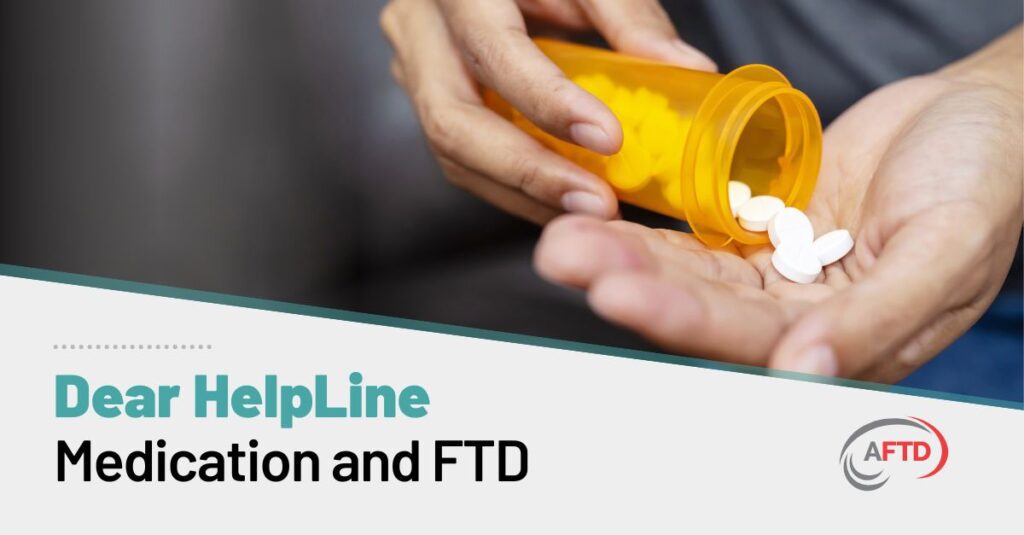Dear HelpLine: Medication and FTD

Dear HelpLine,
My mom has FTD and we have an upcoming appointment with her physician. We’d like to talk about medications to help with some of her symptoms. What should we know about medication and FTD?
While there are currently no medications available that can slow or stop FTD’s progression, some drugs can be prescribed off-label to manage symptoms or behaviors that nonpharmacological approaches alone have not adequately addressed. Doctors have leeway to prescribe drugs for purposes that have not been specifically approved by the U.S. Food and Drug Administration, in a practice known as “off label” prescribing. Off-label means that the medication has not been through clinical trials for FTD, and there is little guidance available for its use to treat FTD.
In FTD, nonpharmacological interventions should always be considered first. Examples of potentially successful approaches include:
- Behavioral strategies: Addressing challenging behaviors by identifying triggers and modifying the environment, care routine, and other approaches.
- Environmental modifications: Creating a calm, safe, and structured environment to reduce symptoms.
- Communication strategies: Using communication approaches and nonverbal cues to enhance understanding and reduce frustration during interactions.
Speech and occupational therapy referrals can also assist with identifying and maximizing these approaches. The person living with FTD should have a medical evaluation to rule out any other conditions that could be contributing to their symptoms. (AFTD’s Managing FTD page offers more information about approaches to FTD symptoms.)
Nonpharmacological approaches may not always work by themselves; symptoms such as anxiety and agitation may persist. In such cases, medications may be considered alongside nonpharmacological approaches.
Depending on the person’s care team, prescriptions may be issued by a neurologist, neuropsychiatrist, geriatric psychiatrist, nurse practitioner, physician’s assistant, geriatrician, or primary care provider. When scheduling appointments, clarify whether the clinician is comfortable prescribing; if not, ask them to refer you to someone who can. A close working relationship with the prescriber, including conversations around the risks and benefits of medications, is especially important when discussing potential options.
When preparing for a medical appointment, the person with FTD and/or their care partners should identify the most pressing care issues and obstacles they face; this will help the prescriber consider the best options. Keep a log or calendar of symptoms, as well as the positive and negative side effects of medications to share with the prescriber. AFTD’s Behavior Tracker can help you document and share symptoms you have been noticing. Apps designed to store and manage health records can also help keep you organized.
It’s important for treatment plans to be individualized, focusing on symptom management and quality of life. New medications will often be started at a low dose and increased if needed. Some medications can take time before you see the full effect. Healthcare professionals should closely monitor medications and their effects so they can adjust (or stop) medications as the disease progresses and symptoms change.
Learning about Types of Medications
This chart is for informative purposes only and to provide a general understanding of the topic. It should not be considered or used as medical advice. If you have questions regarding your own specific situation, you should speak with your medical providers.
Types of Medications |
Examples |
Symptoms |
Notes |
Antidepressants |
|
|
|
Antipsychotics |
|
|
|
Mood Stabilizers |
|
|
|
Benzodiazepines |
|
|
|
| Cholinesterase inhibitors and Alzheimer’s medications |
|
|
|
- AFTD’s Treating FTD Page
- Medications Guidance Document
- AFTD Webinar: Treatment of Behavioral Variant FTD
- Medication information begins at 40:20
Additional Resources and References
- UCSF Memory and Aging Center – Medications and Dementia
- Provides information about specific medications and includes notations about their use in FTD
- Practical Neurology: Frontotemporal Dementia
- ALS Untangled
- Provides reviews of alternative and off-label treatments in ALS
- A Healthcare Provider’s Guide to bvFTD
- Therapy and Clinical Trials in Frontotemporal Dementia: Past, Present, and Future
- Boxer et al, Journal of Neurochemistry. 2016 Aug; 138(Suppl 1): 211–221
- Management of Frontotemporal Dementia: Targeting System Management…
- Jicha et al, Neurodegenerative Disease Management. 2011 April; 1(2): 141–156
By Category
Our Newsletters
Stay Informed
Sign up now and stay on top of the latest with our newsletter, event alerts, and more…
